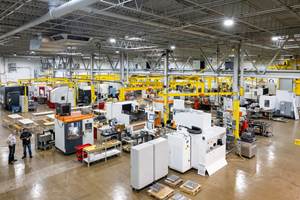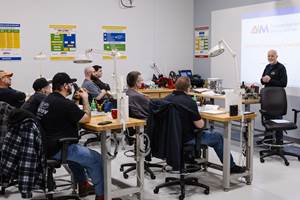NIMS Commits to Upskill Precision Manufacturing Workforce
The organization will work to expand competency-based apprenticeships.
Share
The National Institute for Metalworking Skills (NIMS) has announced a commitment to work with employers, education providers, workforce development organizations and other stakeholders to expand Competency-Based Apprenticeships.
As part of the commitment, NIMS will develop and disseminate an Apprenticeship Blueprint to help companies expedite implementation of customized apprenticeships that meet their talent needs. NIMS will also set a goal to issue 1,000 industry-recognized credentials to individuals in Apprenticeship programs. Through outreach to stakeholders, NIMS will provide a package of tools, resources, and technical assistance to support stakeholder efforts to establish or expand their use of apprenticeships.
The White House highlighted the commitment as part of its Upskill Summit today, which gathered 150 employers, labor leaders, foundations, non-profits, educators and tech innovators from across America who are focused on equipping workers of all ages with the skills they need to advance in their careers. NIMS Executive Director, James Wall, and Roderick Jones, NIMS Board member and Senior Advisor, DMG Mori Seiki USA, attended the Summit.
“As manufacturing becomes more complex, technology-driven and innovative, companies, workers, and students need to keep up with evolving industry standards and job requirements so they can get ahead in their careers,” said James Wall, executive director, NIMS. “Our Competency-Based Apprenticeship System helps companies advance front line workers into higher-skilled jobs through high-quality, customized training in which participants earn both national industry certifications and company-specific credentials.”
The NIMS Competency-Based Apprenticeship helps companies:
- Recruit and advance skilled individuals to the precision manufacturing industries by offering opportunities to “work and learn” towards a valuable career
- Prepare the next generation of employees by providing a strong foundation of skills that are critical for them to advance in careers
- Ensure workers have the right skills, meeting industry-wide and company-specific standards and requirements needed for long-term success
- Build a customized training program that leverages national industry-recognized credentials to make on-the-job training more efficient and advanced
For more information about the NIMS Competency-Based Apprenticeship System, visit http://nimsready.org/the-new-apprenticeship/.
DMG Mori Seiki USA also made a multifaceted commitment to upskill its workforce as part of the Summit. In 2015, the company will invest in new hires of all levels by starting a training program that will include three weeks of training, in which it will send its employees to Japan and Germany to learn its corporate culture and passion for manufacturing. The program is aimed to increase employee engagement and retention as well as provide advanced skill training for USA production and quality control workers. The company will also launch a Management Education Program for leaders, supervisors, and managers; a tiered compensation program for factory workers that will lay out a clear path for upward mobility via an initial skills assessment and the establishment of skills targets; a program to encourage earning of NIMS skill credentials with 300 direct field technicians and other employees; and expansion of existing apprenticeships for Service Engineers to Application Engineers by launching at least one new class in 2015, 2016 and 2017. DMG Mori Seiki USA will also start a second shift so that employees have more choice in when they work so that they can access learning and development opportunities.
“Education is a business imperative for us,” said Rod Jones, senior advisor, DMG Mori Seiki USA. “Offering continuous opportunities for our employees to upgrade their skills not only helps them advance, but increases morale, safety, credibility, and pride in our company.”
Related Content
How to Improve Your Current Efficiency Rate
An alternative approach to taking on more EDM-intensive work when technology and personnel investment is not an option.
Read MoreCross Training, In-House Capabilities and Collaborative Design Move Helm Tool Forward
Cross-training, bringing it all in-house, molding and collaborative design are essential to Helm Tool's success.
Read MoreMold Maintenance Continues to Matter: Enhanced Training Program in a New Facility
I attended a MoldTrax mold maintenance workshop in 2019 and shared my experiences, and despite changes in ownership, the workshop's remarkable value endures, as discussed in a recent Q&A with the current leadership.
Read MoreMMT Chats: The Science of Moldmaking, Part 2
In Part 2 of this two-part MMT Chat, Christina and Don continue their conversation by exploring lean manufacturing and tips on how to attract, train and retain the future workforce.
Read MoreRead Next
Are You a Moldmaker Considering 3D Printing? Consider the 3D Printing Workshop at NPE2024
Presentations will cover 3D printing for mold tooling, material innovation, product development, bridge production and full-scale, high-volume additive manufacturing.
Read MoreHow to Use Strategic Planning Tools, Data to Manage the Human Side of Business
Q&A with Marion Wells, MMT EAB member and founder of Human Asset Management.
Read MoreHow to Use Continuing Education to Remain Competitive in Moldmaking
Continued training helps moldmakers make tooling decisions and properly use the latest cutting tool to efficiently machine high-quality molds.
Read More























